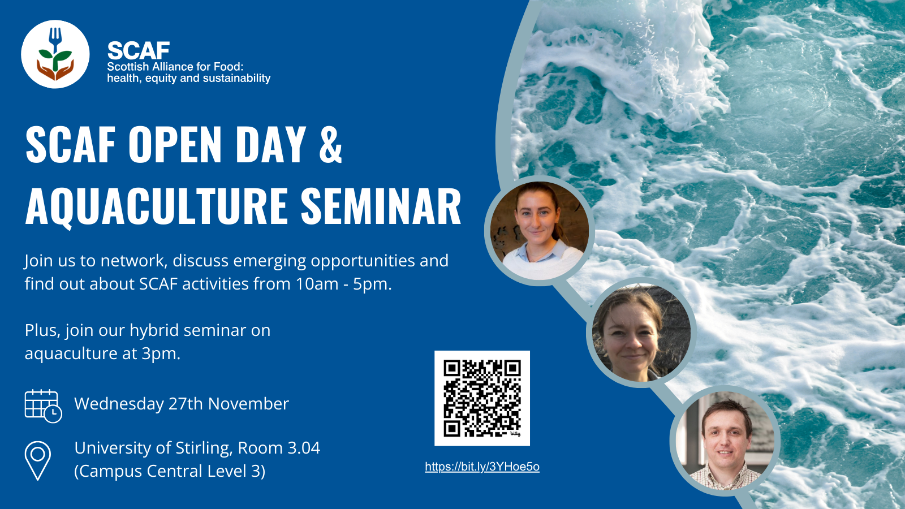SCAF Open Day and Aquaculture Seminar | 27th November 2024
Published: 9 November 2024
Join us to network, discuss emerging opportunities and find out about SCAF activities. Plus, join our seminar on aquaculture in-person or online!

Drop in anytime at the University of Stirling, Room 3.04 (Campus Central Level 3) between 10am and 5pm to network, discuss emerging opportunities, find out about SCAF activities, and explore the SCAF Food Lens Exhibition. The day is designed to encourage making connections and to foster collaboration and creativity. All are welcome - researchers, practitioners and members of the public!
Seminar on Aquaculture: Fish and Seafood | Opportunities for the Health of the People and the Planet
Date & Time: Wednesday 7th November, 3pm
Location: University of Stirling/online
Join us to hear talks by Stephanie Horn, Alexandra Pounds and Matthew Sprague exploring the role of aquaculture in the food system.
Stephanie Horn: Combining public and planetary health assessments of aquaculture systems in Bangladesh.
Stephanie Horn is a postdoctoral researcher at the Institute of Aquaculture where she is evaluating the nutritional importance and sustainability of European and Asian aquaculture production systems. Her core expertise is centred around environmental and nutritional performance assessment of various aquaculture and integrated agriculture-aquaculture systems.
In her talk, Stephanie will discuss transforming global food systems to provide sustainable, affordable, and nutritious food requires data-driven policies and rigorous assessments. Nutritional Life Cycle Assessment (n-LCA) models combine environmental and nutritional performance metrics, as used in this study on tilapia aquaculture in Bangladesh. By analysing fishponds, rice-fish, and poultry-fish systems with the Potential Nutrient Adequacy (PNA) metric, researchers found that while poultry-fish farms offer the highest nutritional quality, fishponds have better environmental outcomes. Tilapia and two other fish species stood out for their affordability and low environmental impact, highlighting tilapia’s potential to deliver sustainable, affordable nutrition in Bangladesh.
Alexandra Pounds: Expanding the Big Five: Achieving zero emissions by increasing seafood consumption diversity
Alexandra Pounds is a PhD candidate at the University of Stirling and Research Lead for ThinkAqua. She wants to increase understanding of how fish and other aquatic foods can be used to enhance global food and nutrition security. Originally from the US, Alexandra now lives in Scotland and spends a lot of time in Africa. She is currently the Impact Research Lead at ThinkAqua, a UK-based charity and about to defend her PhD thesis (the role of fish in food security of fishing communities on the Kenyan shores of Lake Victoria) at the University of Stirling.
In her talk, Alexandra explains that UK consumers eat little seafood, which generally has lower carbon footprints that terrestrial animal-source foods. When UK consumers do eat seafood, they eat the ‘Big Five’ (cod, haddock, salmon, tuna, shrimp), which have higher carbon footprints relative to low-trophic aquaculture products (LTAP), like locally produced seaweed and shellfish. Yet, many consumers (particularly lower-income ones) refrain from eating LTAP due to price, inconvenience, and unfamiliarity (of taste and cooking methods). Thus, she is aiming to scope convenience products commonly consumed among low-income demographics and assess which ones could include LTAP to lower their carbon footprints and increase the product’s nutritional value. This will increase the nutrition and sustainability of these convenience products in the UK.
Dr Matthew Sprague: Why seafood matters: The role of farmed salmon in supplying omega-3
Dr Matthew Sprague is a lecturer in nutrition at the Institute of Aquaculture, University of Stirling. His research focusses on investigating alternative ingredients for farmed fish and the potential impacts these may have on the final product quality, particularly with respect to the long-chain omega-3 polyunsaturated fatty acids (EPA and DHA). Additionally, he has taken a recent interest in examining the nutritional quality of seafood available to consumers and how they contribute to recommended nutrient intakes based on current dietary guidelines.
In his talk, he explains that seafood is a rich source of high-quality protein and micronutrients, but also the main dietary supply of the health promoting omega-3 long-chain polyunsaturated fatty acids, EPA and DHA. Accordingly, consumers are told to consume two portions of fish per week, of which one should be oily. However, this appears insufficient to meet recommended EPA+DHA intakes. Furthermore, with wild capture fisheries stagnated and a growing demand for seafood from an increased global population more of our seafood is being farmed. Thus, he will look at whether farmed fish (focussing on salmon) can be a future source for these beneficial fatty acids.
First published: 9 November 2024

